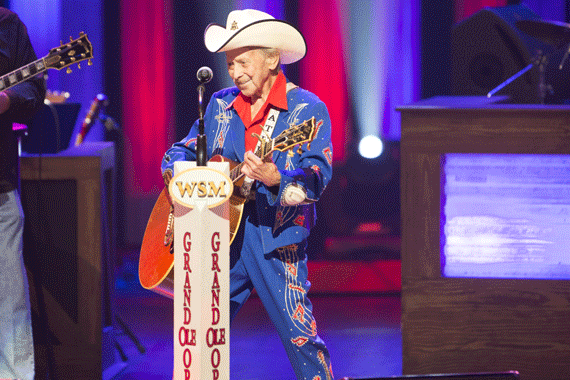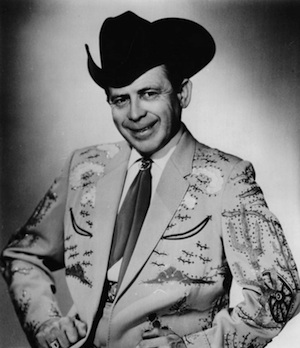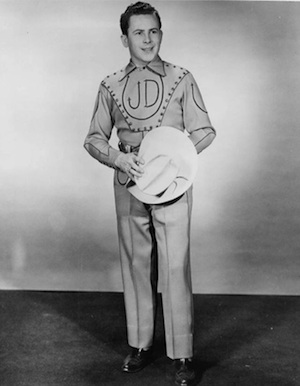

Grand Ole Opry star Little Jimmy Dickens. Photo: Chris Hollo
The public is invited to celebrate the life of the late, legendary Jimmy Dickens at both his visitation and his funeral service.
The visitation is scheduled for Wednesday, Jan. 7, at the Woodlawn-Roesch-Patton Funeral Home from 4-8 p.m. The building is in Woodlawn Cemetery at 660 Thompson Lane. A Celebration of Life service will be held at the Opry House on Thursday, Jan. 8, at 11 a.m. Friends, family and the public are welcome at both events.
Jimmy Dickens passed away Friday afternoon, Jan. 2, due to a cardiac arrest. A trouper to the end, Dickens turned 94 years old on Dec. 19 and performed on the Grand Ole Opry the following day, singing his hit “Out Behind the Barn” and delivering his trademark jokes. He suffered a stroke five days after his final performance and died a week later.
The Country Music Hall of Fame inductee was the oldest member of the Opry cast. The widely loved entertainer was the show’s goodwill ambassador, as well as its elder statesman.
Last Friday’s Grand Ole Opry show was dedicated to Dickens by Opry manager Pete Fisher, who eulogized the star by saying he was, “one of the most legendary, entertaining and beloved artists in country music history.” Fisher choked back tears as he added, “We will never forget….”
Bill Anderson saluted his fellow Opry cast member on Friday’s show by performing the 1958 Dickens favorite “Family Reunion.”
Marty Stuart called Dickens, “the heart, the soul and the spirit of the Grand Ole Opry.” Brad Paisley said Dickens was, “my hero,” and added, “I think everyone who ever met him loved him instantly and forever.” Both Paisley and Vince Gill featured Dickens in their music videos and sang with him.
“I’ve always related to him and loved him as a person, as a friend and as an entertainer,” said Dolly Parton. Both Parton and Martina McBride performed the late star’s 1950 tune “I’m Little But I’m Loud” during their careers.
“He just knew how to entertain,” said Ricky Skaggs. “His country charm, sharp wit and graciousness made him a star that everyone wanted to meet.”
During the weekend, eulogies and remembrances of Dickens poured in from dozens of country entertainers. Fellow Opry cast members Mel Tillis, Larry Gatlin, Doug Green of Riders in the Sky, Carrie Underwood, Pam Tillis, Rascal Flatts, Alan Jackson, Reba McEntire and Charlie Daniels were among them.
James Cecil Dickens was born in the tiny hamlet of Bolt, West Virginia into a clan of coal miners. He was the oldest of 13 children. Everyone in his family was musical, and Dickens dreamed of a country-music career from an early age. He began performing on West Virginia radio stations in 1939-40.
He joined station WLW in Cincinnati in 1945. Opry superstar Roy Acuff recalled that Dickens stole a show from him there. He encountered Dickens again at WKNX in Saginaw, Michigan, three years later. Impressed once more, Acuff arranged for Dickens to come to the Opry and to Columbia Records.

Jimmy Dickens in 1971.
Billed as “Little” Jimmy Dickens because of his 4’11” stature, he became a Grand Ole Opry member in 1948 and scored his first Columbia hit in 1949 with the humorous novelty “Take an Old Cold ‘Tater (And Wait).” His friend, Hank Williams, nicknamed him “Tater” as a result. Williams penned “Hey Good Lookin’” for Dickens, but decided to record it himself, instead.
Dickens became well known for novelty ditties such as 1950’s “A-Sleepin’ at the Foot of the Bed” and 1954’s “Out Behind the Barn.” But he was also capable of heart-tugging sentiment, as in 1949’s “My Heart’s Bouquet” and “Pennies for Papa.”
His ballad mastery was evident in “Life Turned Her That Way,” “Farewell Party,” “Take Me As I Am (Or Let Me Go)” and “We Could,” all of which he originated but later became hits for others.
During the 1950s, Jimmy Dickens had one of country music’s most fiery and exciting bands. His Country Boys group featured a loud, twin electric-guitar attack that pre-figured the rise of rockabilly music, as well as the 1970s sound of The Allman Brothers. Hot singles such as 1950’s “Hillbilly Fever,” 1953’s “You All Come,” 1954’s “Rockin’ with Red” and 1958’s “I Got a Hole in My Pocket” showcased his band’s prowess.
Dickens musicians included such future instrumental greats as Grady Martin, Buddy Emmons, Thumbs Carlille, Bob Moore and Walter Haynes. Those weren’t the star’s only lasting contributions. With 1949’s “Country Boy,” Jimmy Dickens introduced Hall of Fame songwriters Boudleaux and Felice Bryant. In 1951, Dickens discovered Marty Robbins and brought him to Columbia Records.
He was also a Nashville pioneer in costuming. Dickens was one of the first Opry artists to sport flashy, rhinestone-bedecked suits crafted by tailors such as Nudie Cohen. “Nudie” suits later became synonymous with country stardom.
Jimmy Dickens left the Opry in 1957. His hits resumed with the ballads “The Violet and the Rose” (1962) and “Another Bridge to Burn” (1963).
In 1964, he became the first country artist to circle the globe on tour. His extensive overseas activity was partly because of his commitment to entertaining at U.S. military bases. He performed several times for the troops during the Vietnam War, even in combat zones.
Dickens returned to novelty material with 1965’s “May the Bird of Paradise Fly Up Your Nose,” which became his biggest hit. The pop and country smash led to TV showcases on The Tonight Show, Hullabaloo and Where the Action Is. Dickens also appeared in the films Tennessee Jamboree (1964) and Second Fiddle to a Steel Guitar (1966).
In 1964, George Jones saluted the star with the tribute LP George Jones Sings Like the Dickens! Ricky Van Shelton, Ray Price, Mel Tillis, Charley Pride, Wanda Jackson and Gene Watson are among the other stars who have revived Dickens songs.
“When the Ship Hit the Sand” (1966) and “Country Music Lover” (1967) became his last top-40 hits, but Jimmy Dickens continued to tour relentlessly in the 1970s and 1980s. He honed his comedic skills and became renowned for his quips, jokes and wisecracks.
Nevertheless, he released his biggest tear-jerker in 1970. This was the dead-child recitation “Raggedy Ann,” which remained in his repertoire for the rest of his life.
Dickens rejoined the Opry cast in 1975. He was elected to the Country Music Hall of Fame in 1983. Another recitation, “Forgive Me Santa,” became a video hit during the 1987 Christmas season.

Jimmy Dickens in 1955
In 1996, Jimmy Dickens and his wife Mona celebrated their 25th anniversary by renewing their vows on the Opry stage. After more than 50 years as a travelling entertainer, he finally retired from the road in 1997.
The Academy of Country Music gave him its Pioneer Award in 2006. Brad Paisley and Trace Adkins were among those honoring Dickens in 2008 on the 60th anniversary of his Grand Ole Opry induction. Adkins, Diamond Rio, Little Big Town and Old Crow Medicine Show were among those Dickens welcomed into the Opry cast in later years.
He survived several serious health crises during the past decade. He was hospitalized in 2004, 2008, 2009 and 2013 for various ailments.
Jimmy Dickens is survived by his wife Mona, daughters Pamela Detert and Lisa King, grandchildren Amanda Detert and April Remick and great-grandchildren Keylee Remick, Tanner Remick and Tyler Remick, as well as three sisters.
His Thursday entombment in the Woodlawn Cross Mausoleum will be private for the family.

About the Author
Robert K. Oermann is a longtime contributor to MusicRow. He is a respected music critic, author and historian.View Author Profile


